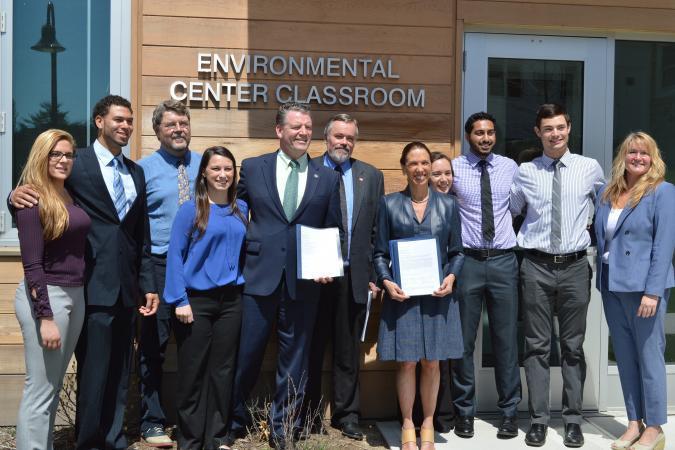Civic Engagement through Elephant Advocacy
Students from the Environmental Class.
This coming February, when the Hanneford Circus comes to the Westchester County Center in White Plains, a staple act will be missing from their roster. Because of the Elephant Protection Act, which goes into effect January 2019, elephants are no longer allowed to be used in entertainment acts like circuses.
This law, signed by Governor Andrew Cuomo in October 2017, was spearheaded by Pace students and faculty in the Environmental Clinic course. This course provides students with the opportunity to do casework on environmental policy through the intersection of policy, law, business, science, and technology.
While the course focuses on environmental issues, it is not just for environmental studies majors. The interdisciplinary nature of the Environmental Clinic provides all students with the civic engagement skills necessary to become contributing citizens.
“Issues require a lot of creative thinking to solve,” said Michelle Land, one of the Environmental Clinic’s professors. “If everybody sitting here is an environmental studies student, they’re all going to be thinking pretty similarly. You want someone to upset the applecart from economics and say, ‘Woah, you weren’t thinking about this.’”
The class chooses an issue or two to focus on at the beginning of each semester. Sometimes the course’s faculty have ideas to focus on, but other times the issues originate from the students.
“We look at issues that are typically environmental-related where the solution lies within a government capacity,” said Land. “The students have looked at every level of the government in terms of who should we be appealing to in order to solve this problem.”
Professor Land worked for years on the Elephant Protection Act. She has a background in wildlife biology and environmental law, so community members came to her to express their concern for the animals in the Hanneford Circus. In response, she started drafting bills on the topic of animals used as part of entertainment acts in 2009.
In 2014, the Environmental Clinic students took up Land’s passion. The first group of students working on the Elephant Protection Act began by creating an outreach campaign. They created a short public service announcement to encourage the public to support the bill. Each semester, students refined the bill as they did more research on the bill and figured out what was politically feasible.
“It starts at the very beginning with students researching and becoming subject matter experts on that specific area,” said Land “There’s economic analysis that has to happen, there’s going to be social analysis, and there’s going to be a conservation angle to look at. So the students all take a piece of that issue and become experts in that subtopic so that when we do go meet with legislators or government officials, each student has an area that they specialize in.”
After the class drafts a bill, they arrange meetings with relevant government officials and begin the lobbying process. They often take a trip to Albany where they can meet with assembly members, senators, and staff to advocate for their bill.
“Legislators love the idea that students are coming to them,” Land said. “I think the students being part of the process is more effective than if it were just faculty. They like the idea of students engaging early in their lives and in their careers, caring about their future, and realizing that working with the government can actually be a really good partnership.”
State senator Terrance Murphy, who represents Pleasantville, sponsored the Elephant Protection Act and served as an important connection for students in the Environmental Clinic throughout the legislative process. Once the bill passed both the Assembly and the Senate and was sent to the governor, the class had the opportunity to meet with Governor Cuomo’s staff. A day after their meeting, Governor Cuomo signed the Elephant Protection Act into law.
“It’s exciting to realize that you can be part of the process, that’s what a lot of students are surprised by in the clinic,” Land began. “Everyone assumes that policymaking is for someone else, that it’s someone else’s job. They don’t realize that all of us have access to it in various ways. That’s empowering for someone to realize that they can be part of lawmaking.”
Now that the Elephant Protection Act was a success, the Environmental Clinic is now focused on new issues. One issue is that pet stores are allowed to sell invasive species like the red-eared slider turtle and goldfish. People often release these back into the wild when they no longer want to care for them. Turtles released into the forest when they get too big and goldfish released into Choate Pond when students move out can upset the ecological environments because they are not native species.
The other issue facing the Environmental Clinic is road salt. It is essential for road safety in the winter, but it is easily overused. In some areas, road salt gets into people’s wells and ends up in their drinking water. The clinic wishes to implement more training for operators dispensing road salt so that road salf is used more effectively and has fewer opportunities to create environmental damage.
The Environmental Clinic is just one avenue for Pace students to access their government and be involved in positive change for the whole community.
“As a citizen, you have access to government in so many ways,” said Land. “You’ve got to show up. You’ve got to be there. You have to have your voice heard because if you don’t, somebody else is going to be heard that may not agree with your principles.”
For students interested in taking the course, it is listed as INT 299J on the Pace website.
Your donation supports independent, student-run journalism at Pace University. Support the Pace Chronicle to help cover publishing costs.

